Fatal Shooting at Kenya Flower Farm, World’s Largest Rose Grower
Supplying UK Supermarkets. Suspected intruder shot dead after Kenyan police called to rose farm that supplies Tesco and Sainsbury’s.
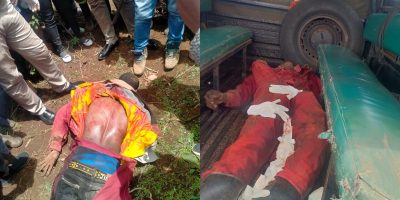
All Global Research articles can be read in 51 languages by activating the Translate Website button below the author’s name.
To receive Global Research’s Daily Newsletter (selected articles), click here.
Click the share button above to email/forward this article to your friends and colleagues. Follow us on Instagram and Twitter and subscribe to our Telegram Channel. Feel free to repost and share widely Global Research articles.
***
A man has died following a shooting at a farm in Kenya that supplies flowers to British supermarkets.
A second man is understood to have been seriously injured.
The shooting happened at 2.30am today near Mount Kenya at Ibis Farm in Timau, which is operated by Flamingo Group.
It is the world’s largest rose grower and top supplier of premium flowers to UK supermarkets.
Customers include Tesco, Sainsbury’s, Morrisons, M&S, Waitrose and the Co-op.
A Flamingo spokesperson told Declassified: “A gang of around 20 people broke into Flamingo’s farm site in Kenya. Flamingo’s guards, who are all unarmed, were on duty at the time and alerted the police.
“Following the arrival of the police there were gunshots and the gang dispersed. Some time later, it became clear that a person beyond the boundary of the site had tragically passed away.
“We extend our sincere condolences to the family of the deceased. Our current priority is ensuring the safety of all personnel.”
Flamingo guards patrol with dogs but claim not to carry weapons and could have been overpowered by the intruders, who sometimes steal drip lines or plastic.
The deceased, who did not work for Flamingo, has been named as Kalulu Mutwiri, a married father of two young children.
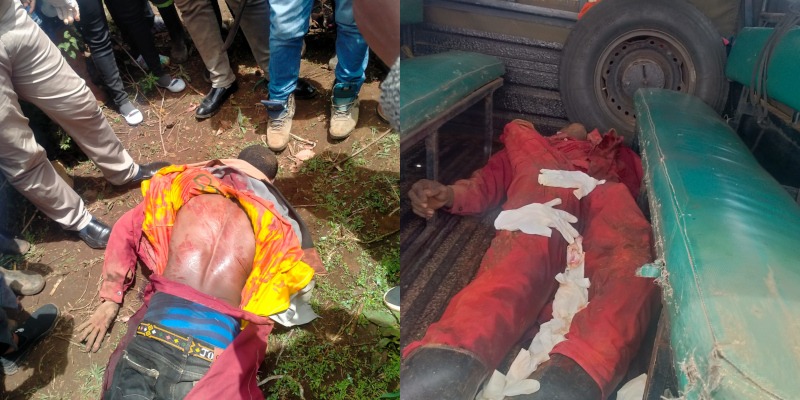
Kalulu Mutwiri’s body was found 200m away from the farm at 9am. (Photo: Supplied)
Local people are furious that Mutwiri was shot dead, apparently at close range, rather than arrested.
Kelvin Kubai, a lawyer who lives in the area, accused those involved of “taking the law into their own hands”.
He told Declassified Mutwiri’s body bore signs of torture and had been dragged by a rope to a nearby river valley.
Kubai believes those responsible hoped heavy rainfall would wash away the body and cover up the death.
Instead police were called back after the body was discovered by community members 200m from the site at 9am, triggering a protest at the farm this morning by around a thousand local villagers.
The protesters demanded an explanation from farm management and some destroyed property inside the site, including setting fire to a tractor.
The situation remains volatile with the farm in shut down and all employees being evacuated.
Kenya’s police were asked to comment. At least one person has been arrested.
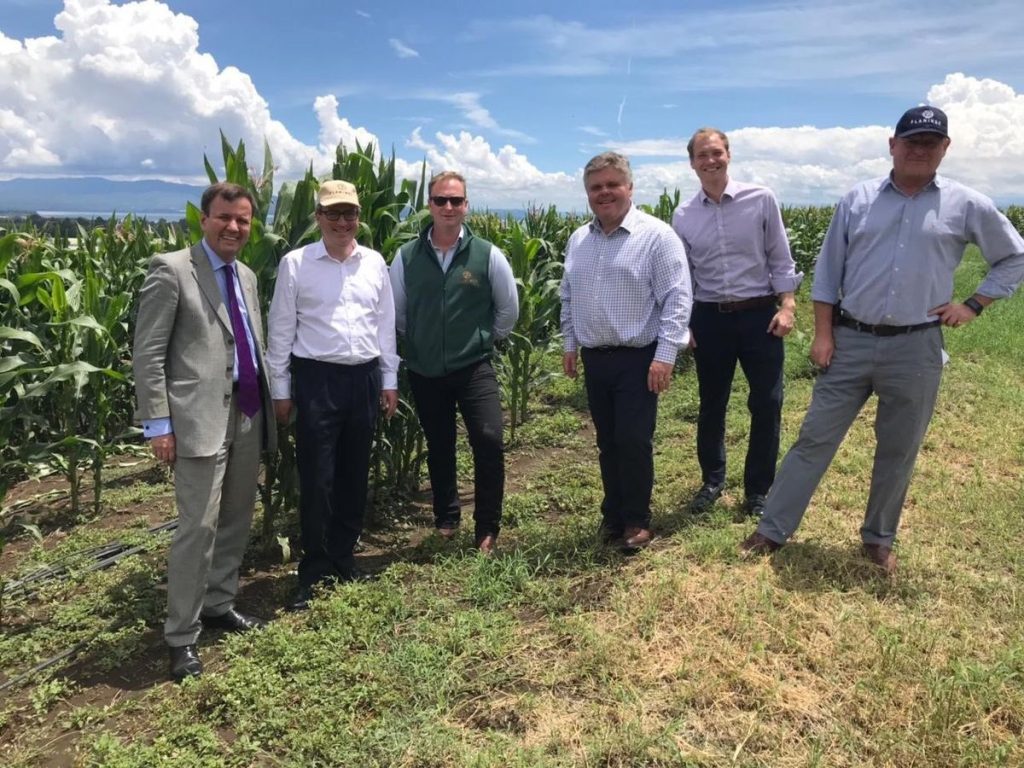
Conservative Party chairman Greg Hands (left) on a tour of Flamingo farms in Kenya as a trade minister in 2018. (Photo: UK Foreign Office)
Lorry crash
The dramatic scenes follow another incident there in December, when dozens of workers were injured after a lorry fell over.
Workers are bussed around the farm in the back of lorries that have no seats.
Between 68 and 136 workers were involved in the accident. Many suffered crush injuries and required hospital treatment.
One man, 28-year-old Samuel Sikuku, received a head injury and died from a blood clot between his skull and brain six weeks later, according to a post-mortem report filed with Kenya’s police.
It stated that Sikuku was “an employee at Flamingo” who was “injured in a motor vehicle accident”.
A pathologist found the cause of death were “complications of chronic subdural haematoma following head injury due to blunt force trauma” and high blood pressure.
The NHS website says “Head injuries that cause subdural haematomas are often severe, such as those from a car crash”.
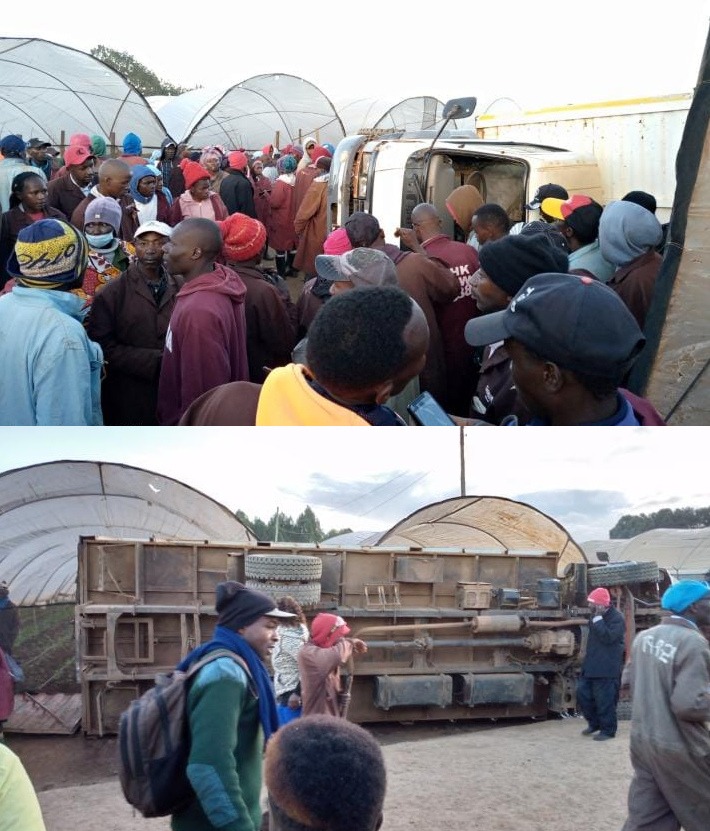
A lorry carrying Flamingo workers fell over at a farm in Timau, Kenya, on 8 December 2022. (Photos: Supplied)
Pay gap
Flamingo, headquartered in Stevenage, Hertfordshire, posted annual post-tax profits of £50m and paid one of its directors annual remuneration worth £1m, according to the company’s most recent accounts.
Its workers in Kenya are expected to pick 1,500 roses a day. At peak times, like Valentine’s and Mother’s Day, the daily target rises to 4,500 stems.
Workers at Timau can be paid as little as £2 a day (365 Kenyan shillings). They receive a death in service payment of just £179 (27,000 shillings).
Many of the workers injured in the accident were employed under one month contracts which were not renewed after the accident.
Kubai commented: “They take the thorns as Flamingo takes the roses.”
In response to the lorry accident, a company spokesperson said: “Flamingo Horticulture takes the safety and wellbeing of all its employees extremely seriously. We strongly refute a number of the issues raised and would highlight our contribution to our employees and communities over 40 years of working in Kenya.
“These include making material contributions, totalling more than £5,000,000 in Kenya, in areas such as education and healthcare. We also run a school feeding programme for local schools in the surrounding community in Nanyuki. We operate to high ethical standards and are subject to regular 3rd party audits from independent bodies.”
‘Ethical business’
Sikuku, who died in the latest incident, had worked at the Flamingo farm in Timau, near Mount Kenya, since 2014.
When Declassified visited the area last year, we saw horticulture workers living in squalid conditions a 40 minute drive from the luxurious Lewa Wildlife Conservancy where Prince William spent his gap year.
Flamingo has previously faced criticism over its flower farms at Kenya’s Lake Naivasha, where nomadic Maasai herders were concerned over high water usage.
Flamingo’s farm at Timau was previously run by Scottish firm Finlays, which acquired much of their land in Kenya during colonial rule when indigenous communities were violently evicted by British settlers.
In February an undercover investigation by the BBC accused Finlays managers of sexually abusing women who work at its Kenyan tea plantations.
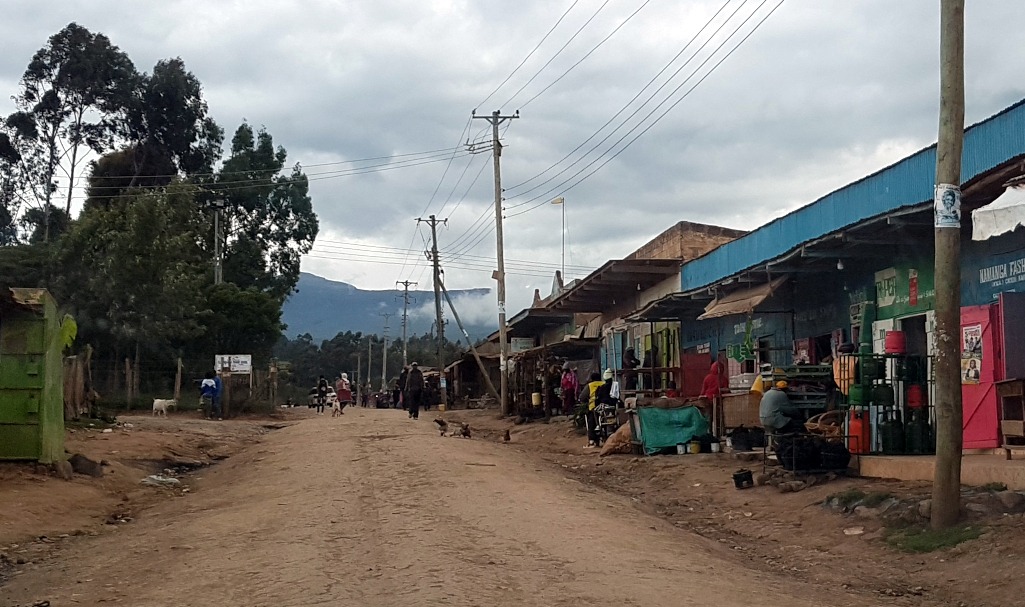
Flower pickers at Timau live in shanty towns. (Photo: Phil Miller / Declassified UK)
Large swathes of Kenya’s most fertile farmland are foreign owned, with some still controlled by the descendents of European settlers.
After independence from Britain in 1963, some land was allocated to local communities. However, the area around Timau was pocketed by a corrupt Kenyan land minister, Jackson Angaine, who sold part of it to Finlays subsidiary Home Grown Kenya.
Last year Kenya’s National Land Commission ruled that some of the land grabbed by Angaine should be returned.
Conservative party chairman Greg Hands toured Flamingo farms in Kenya in 2018 when he was a trade minister, with the British high commission calling the company an “ethical business”.
This week Kenyan MP Francis Kuria Kimani said he suspected some multinational companies were using “large parcels of land across the country…without having to compensate the people of Kenya” and accused foreigners of receiving “preferential treatment”.
*
Note to readers: Please click the share button above. Follow us on Instagram and Twitter and subscribe to our Telegram Channel. Feel free to repost and share widely Global Research articles.
Phil Miller is Declassified UK’s chief reporter. He is the author of Keenie Meenie: The British Mercenaries Who Got Away With War Crimes. Follow him on Twitter at @pmillerinfo

